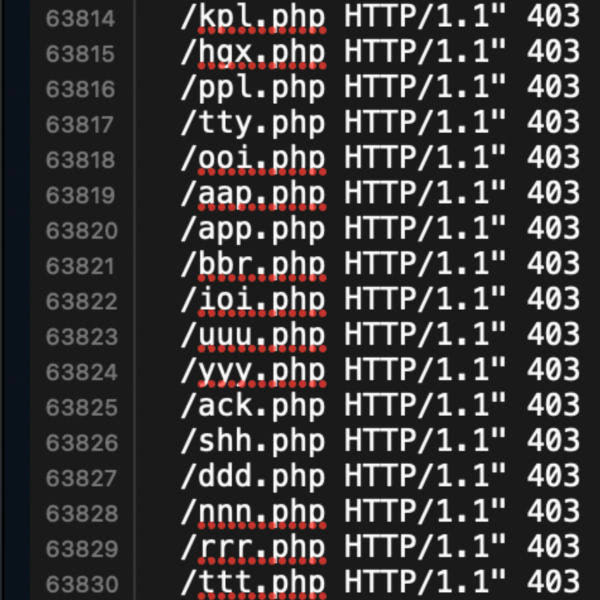This is a quick post following from the latest redesign of my WordPress plugins website, Plugin Planet. There, I make use of WordPress great query functionality to display archives of multiple categories. For example, here is the combined archive for BBQ Pro and Docs. So that category archive displays all documentation posts for BBQ Pro. Likewise for other categories, for example here is the combined archive for Banhammer Pro and Tutorials. That category archive displays all tutorial posts for Banhammer […] Continue reading »

I’ve been working on developing the 8G Firewall. Digging through log files and crunching the data, the big new trend I’m noticing is heavy scanning for easy targets, low hanging fruit. Bad actors are looking for any little hidden files stashed on your server. Mostly PHP files, also ZIP and RAR files, and other file formats commonly used for compressing and archiving content. Basically, anything that might contain useful information (like login credentials, database backups, email addresses, etc.). Also, 99% […] Continue reading »
In WordPress themes and plugins, the Loop is used to display posts on the front end. Typically the Loop displays either a single post (like when you’re viewing a blog post), or multiple posts (like when you’re viewing a category archive). Things get more tricky however, when you want to display posts on a page. Continue reading »

Prismatic is a free WordPress plugin that adds syntax highlighting to code samples. You can use either Highlight.js or Prism.js to make your code snippets look amazing. By default, Prismatic highlights code snippets in both post content and post comments. This quick tutorial shows how to disable highlighting in post comments by adding a simple code snippet to your WordPress. Estimated time to complete ~2 minutes. Continue reading »

Prismatic is a free WordPress plugin that adds syntax highlighting to code samples. You can use either Highlight.js or Prism.js to make your code snippets look amazing. This quick tutorial shares a way to customize Prismatic to save time scrolling thru a bunch of language options. Huge time-saver and simple to implement in a few minutes. Continue reading »
![[ Screenshot showing proper display of PHP code snippet ]](https://perishablepress.com/wp/wp-content/images/2019/code-browser-display-fix-thumb.png)
Recently a reader sent in a bug report about this post on bbPress. For some reason the PHP code snippets were not displaying properly in the browser. Basically, instead of looking neat and tidy as always, the code looked like a garbled mess of spaced-out nonsense. And by “spaced out” I don’t mean in a good way: there was literally like 100px of vertical space breaking up the jumbled lines of code. It was definitely a mess, so I began […] Continue reading »
WordPress provides the wp_headers filter hook and send_headers action hook to add and modify HTTP requests. For front-end pages, these are ideal hooks that should be used whenever possible. Unfortunately however neither hook works on all pages in the WordPress Admin Area. After some experimentation, I found an easy solution to modify HTTP headers on any/all pages in the Admin Area. Continue reading »
![[ Call to undefined function ]](https://perishablepress.com/wp/wp-content/images/2019/fix-error-undefined.png)
I’m seeing a big increase in bot attacks targeting theme files directly. First they get the URL to your theme directory. There are numerous ways for a bot to get this information. For example most themes include assets like CSS and JavaScript files, and the link includes the full URL. So then once they have the theme URL, bad bots will make direct requests for well-known theme template files, like index.php and header.php. Requesting template files directly may reveal possible […] Continue reading »
While working on the site’s 24th redesign, I ended up with about 10 code snippets that were awesome but ultimately not needed. So rather than just delete these tasty functions, I am posting them here for future reference. Who knows, during the next site update I may decide to implement or repurpose some of these techniques. And of course sharing is caring, so feel free to use any of these code snippets in your own projects. Check out the Table […] Continue reading »
This tutorial explains numerous ways to get random items via PHP: numbers, strings, passwords, nonces, images, and more. I use these techniques in various projects, and want to round them all up in one place for easy reference. I’ll be updating this post with additional techniques as I get them. Continue reading »
![[User Enumeration ]](https://perishablepress.com/wp/wp-content/images/2016/user-enumeration.jpg)
This tutorial explains how to block user-enumeration scans in WordPress. As explained in greater depth here, user enumeration happens when some malicious script scans a WordPress site for user data by requesting numerical user IDs. For example, requests for author=1 through some number, say, author=1000, may reveal the usernames for all associated users. With a simple enumeration script, an attacker can scan your site and obtain a list of login names in a matter of seconds. Continue reading »
![[ WP Cron HTTP Auth ]](https://perishablepress.com/wp/wp-content/images/2011/code-snippets-collection.jpg)
Please excuse this self-serving, miscellaneous post, but I’ve just got to purge all of these code snippets and scraps collected over the years. Whenever I update this site, I place any removed/unused code snippets into a giant note file for future reference, just in case. There’s all sorts of different types of code and snippets that just keep growing and growing and.. and finally it gets to a point where I just need to dump everything and start fresh. Welcome […] Continue reading »
![[ Screenshot: Editable and non-editable file permissions in Plesk ]](https://perishablepress.com/wp/wp-content/images/2011/upload-files/file-permissions-01.jpg)
I recently spent some time wrestling with various e-commerce/shopping-cart/membership plugins. One of them was of course the popular WP e-Commerce plugin, which uses a directory named “downloadables” to store your precious goods. I had some large files that needed to go into this folder, but the server’s upload limit stopped me from using the plugin’s built-in file uploader to do so. Continue reading »
![[ RSS Feed Icon ]](https://perishablepress.com/wp/wp-content/images/2011/rss-feed-icon-128.png)
Converting small images to data-URLs is a great way to eliminate HTTP requests and decrease loading time for your pages. Using PHP‘s base64_encode() and base64_decode() functions, we have the power to convert images to data-URLs and vice-versa. This article explains how it all works, and shows some different ways of converting back and forth between original and encoded images. Continue reading »
![[ Enjoying the Evening ]](https://perishablepress.com/wp/wp-content/images/2010/misc-chunks/secure-phpinfo.jpg)
Whenever I find myself working with PHP or messing around with server settings, I nearly always create a phpinfo.php file and place it in the root directory of whatever domain I happen to be working on. These types of informational files employ PHP’s handy phpinfo() function to display a concise summary of all of your server’s variables, which may then be referenced for debugging purposes, bragging rights, and so on. While this sort of thing is normally okay, I frequently […] Continue reading »
![[ WordPress ]](https://perishablepress.com/wp/wp-content/images/2009/misc-chunks/wordpress-logo-blue.png)
One of the most popular articles here at Perishable Press is my January 2005 post, Stupid htaccess Tricks. In that article, I bring together an extensive collection of awesome copy-&-paste HTAccess code snippets. Four years later, people continue to tell me how much they enjoy and use the content as a bookmarked reference for many of their HTAccess needs. The article was even published in a book on Joomla! Security. This is very inspiring to me, so I have decided […] Continue reading »


![[ Screenshot showing proper display of PHP code snippet ]](https://perishablepress.com/wp/wp-content/images/2019/code-browser-display-fix-thumb.png)
![[ Call to undefined function ]](https://perishablepress.com/wp/wp-content/images/2019/fix-error-undefined.png)
![[User Enumeration ]](https://perishablepress.com/wp/wp-content/images/2016/user-enumeration.jpg)
![[ WP Cron HTTP Auth ]](https://perishablepress.com/wp/wp-content/images/2011/code-snippets-collection.jpg)
![[ Screenshot: Editable and non-editable file permissions in Plesk ]](https://perishablepress.com/wp/wp-content/images/2011/upload-files/file-permissions-01.jpg)
![[ Enjoying the Evening ]](https://perishablepress.com/wp/wp-content/images/2010/misc-chunks/secure-phpinfo.jpg)
![[ WordPress ]](https://perishablepress.com/wp/wp-content/images/2009/misc-chunks/wordpress-logo-blue.png)
